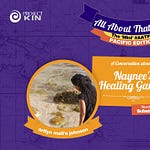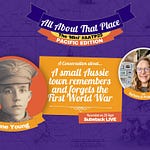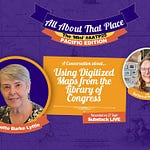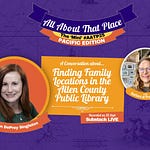For an hour after this recording is posted at 8 PM, in London on October 61 join me on the YouTube channel and Facebook group All About That Place.
After that, I’ll continue the conversation here and be sharing the recording with our Projectkin members. All Pacific Edition programs will be available as soon as they’re posted at Projectkin.org/AATP24.
“Place” in our Family Stories Can Be Complicated
As English speakers in this far-away diaspora, “place” has a starring role in our family stories. For those who were not first peoples, the migrations that brought us here from homelands in Asia, Africa, and Europe were often complicated by force, economic need, or religious persecution.
These became our origin stories, often so wrenching that our connections back to our home country were lost.
These New World and Pacific migrations have fed a different sense of place, which has also added to the richness of our family stories. In conversations, I’ve seen how this sense of place can reflect layers of the other people who have lived, loved, or fought over the same place.
That leads me to what I hope will be my contribution to this conversation: “All About That Place.”
My primary mission for Projectkin is to help people tell their stories. That means that complexity and richness can be the enemy. They can overwhelm the simple desire to tell a story or to share a story you were told.
An untold story is a story lost.
In this short talk, I’d like to show you how reframing a family history story into a project can help accomplish this important job. It can help release a story from the confines of form so you can improve on it, adding it to the growing narrative arc of a family.
You may be the only person on the planet who knows the story you want to tell. Perhaps it draws on the memories of aging elders or offers something important to inspire young children.
If you remember nothing else from this talk, let it be this: An untold story is a story lost.
This presentation reviews key elements holding us back from telling our stories. It suggests that “Projects” offer creative liberation that can make it easier to get stories told.
Unlike published nonfiction narratives, family stories may never be published, and their audiences may never be known to the storyteller. They’re prepared for current generations to better understand themselves and their place in the world and for later generations to make connections they might have missed.
Resources & References
This talk is intended to inspire you to pursue your own projects or to invite family members to collaborate on your work. It’s not intended to share any specific set of family stories.
However, references are made to the work of others. The following is a list of resources and references in rough order of appearance during the presentation.
17th Century Maps of the World
Source: “Atlas or Description of the World” by Frederik deWit, 1690, Amsterdam. Digitized 07-01-2015. Original: University Library Vrije Universiteit, Netherlands. Magnum Mare del Zur cum Insula California, page 143. Full Album used for images for Africa, Asia, Europe, etc. at around the 1:00 mark.
Why people migrated
A Leap of Faith — Source: “A history of the United States for schools,” 1901, Wikimedia.org
A Pursuit of Dreams — Source: “Mulberry St., New York, N.Y.,” Detroit Publishing Company c1900, Library of Congress.
Intermarried, changed names, and moved — Sources:
“Interracial Chinese-Hawaiian Family,” est. 1920s Wikimedia.org
“Gail Pursell, who married John Macdonald at St. Stephens Church in September 1996.” Credit: John Macdonald, Wikimedia.org
“Breaking the sake barrel by Joshua Rappeneker in Tokyo” by Joshua Rappeneker on Flickr
“Buttsole thatched cottages, Eastry, Kent, England” vintage postcard, between 1900 and 1910, Wikipedia.org
“It’s a small world opening” Walt Disney and Louis B. Lundborg at the opening of it's a small world at Disneyland in California, 31 May 1966, UCLA Library, Digital Collection
“All Nations Pageant At The Official Opening Of R.I. Baker School” 22 June 1950 Galt Museum & Archives on The Commons
“Crookwell Public School - Crookwell District Rural School - Australian Commonwealth Jubilee Celebrations Pageant,” 1951, State Records NSW
“Hawaiian chiefs in traditional costume,” Native Hawaiian chiefs dressed in pageant clothing. Solomon Peleioholani on the left. Before 1916. Wikipedia, Hawaii State Archives. Call Number: PP-62-8-020
“Hawaiians in pageant costume,” Native Hawaiians dressed in pageant clothing. Solomon Peleioholani on the left. Wikipedia, Hawaii State Archives. Call Number: PP-62-8-003
Layers of other people who have lived there
“From birthdays past, MCB Hawaii celebrates Corps’ history, holds uniform pageant,” Nov. 10, 2010. The pageant was held to celebrate the Marine Corps' 235th birthday and featured more than 30 Marine and Navy actors in uniforms from different periods. Wikipedia, United States Marine Corps with the ID 101110-M-2339L-085
Our Contribution
Screenshots from Projectkin Project Recipes, see details below.
Frustrated people at their computers (Canva.com)
Monarch Butterfly video (Canva.com)
Chinese Brush Painting
“Xia Gui - Pure and Remote View of Streams and Mountains - right half” In the collection of the National Palace Museum, Taipei, Taiwan
Brush painting in progress video (Canva.com)
Puppy running down a hallway with a bone video (Canva.com)
A jumble of family photos and artifacts (credit: Barbara Tien and family, All Rights Reserved.)
Jacob Riis, New York Tenament Photographs, from The American Yawp, “How the Other Half Lived: Photographs of Jacob Riis”
Jacob Riis, “Lodgers in a Crowded Bayard Street Tenement--'Five Cents a Spot, 1889” via Wikipedia
Jacob Riis, “Sleeping, homeless children,” before 1914 via Wikipedia
Jacob Riis, “A Growler Gang in Session,” Preus Museum via Wikipedia
Projectkin Project Recipes referenced
Encouraging the Reluctant Storyteller, by Lady Esi (Bridget)
A Family Cookbook Spanning Five Generations by Kerri Kearney
If you’re interested in our work at Projectkin.org, we’d be delighted to have you join us. The community is hosted on Substack as part of the growing genealogy community. Our programming is free, and we host several monthly events and programs. Learn more at Projectkin.org/about
8 PM in London on October 6 will be 12/3 PM PT/ET in North America; Across the International Dateline, it’s October 7th at 8 AM in New Zealand and 6 AM in Sydney, Australia. For more times, see WorldTimeBuddy.














